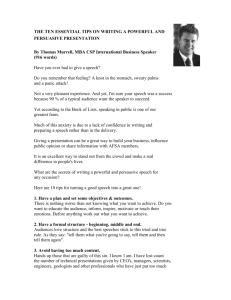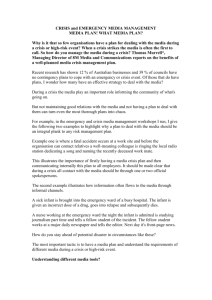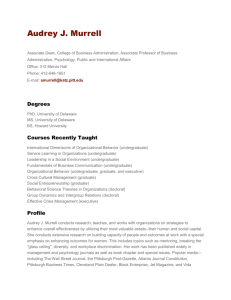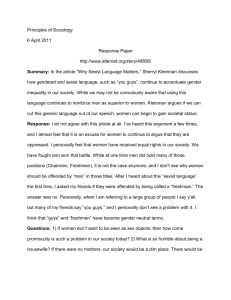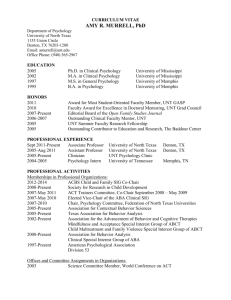Building a (Better) Burger Empire
advertisement
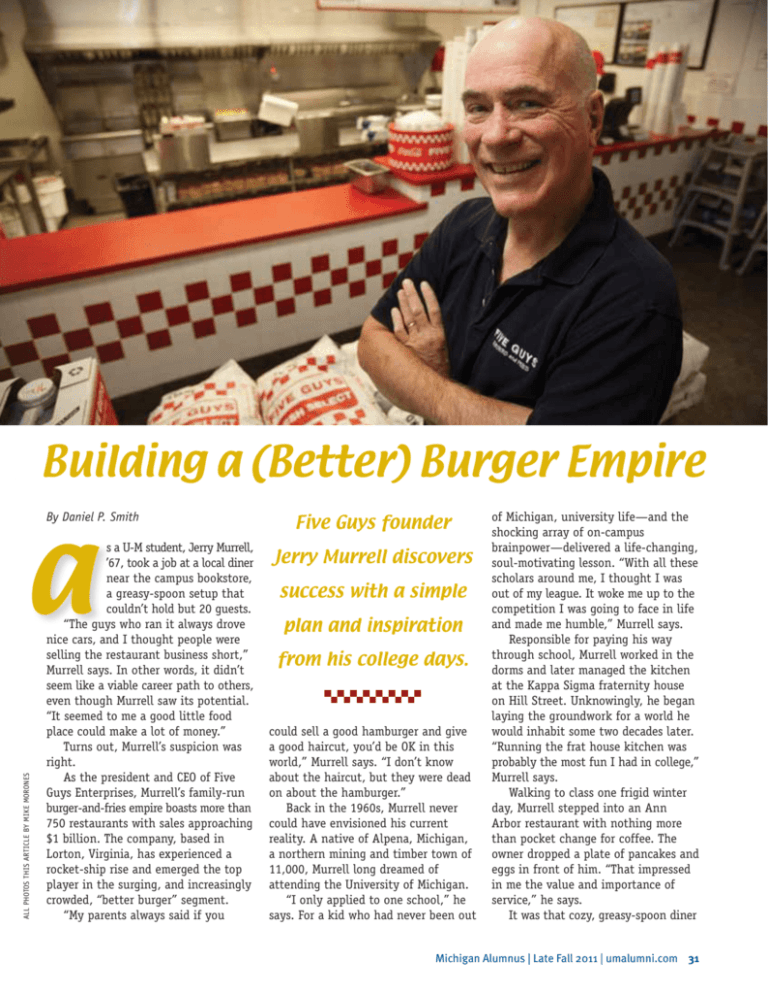
Building a (Better) Burger Empire a all photos this article by Mike Morones By Daniel P. Smith s a U-M student, Jerry Murrell, ’67, took a job at a local diner near the campus bookstore, a greasy-spoon setup that couldn’t hold but 20 guests. “The guys who ran it always drove nice cars, and I thought people were selling the restaurant business short,” Murrell says. In other words, it didn’t seem like a viable career path to others, even though Murrell saw its potential. “It seemed to me a good little food place could make a lot of money.” Turns out, Murrell’s suspicion was right. As the president and CEO of Five Guys Enterprises, Murrell’s family-run burger-and-fries empire boasts more than 750 restaurants with sales approaching $1 billion. The company, based in Lorton, Virginia, has experienced a rocket-ship rise and emerged the top player in the surging, and increasingly crowded, “better burger” segment. “My parents always said if you Five Guys founder Jerry Murrell discovers success with a simple plan and inspiration from his college days. could sell a good hamburger and give a good haircut, you’d be OK in this world,” Murrell says. “I don’t know about the haircut, but they were dead on about the hamburger.” Back in the 1960s, Murrell never could have envisioned his current reality. A native of Alpena, Michigan, a northern mining and timber town of 11,000, Murrell long dreamed of attending the University of Michigan. “I only applied to one school,” he says. For a kid who had never been out of Michigan, university life—and the shocking array of on-campus brainpower—delivered a life-changing, soul-motivating lesson. “With all these scholars around me, I thought I was out of my league. It woke me up to the competition I was going to face in life and made me humble,” Murrell says. Responsible for paying his way through school, Murrell worked in the dorms and later managed the kitchen at the Kappa Sigma fraternity house on Hill Street. Unknowingly, he began laying the groundwork for a world he would inhabit some two decades later. “Running the frat house kitchen was probably the most fun I had in college,” Murrell says. Walking to class one frigid winter day, Murrell stepped into an Ann Arbor restaurant with nothing more than pocket change for coffee. The owner dropped a plate of pancakes and eggs in front of him. “That impressed in me the value and importance of service,” he says. It was that cozy, greasy-spoon diner Michigan Alumnus | Late Fall 2011 | umalumni.com 31 “Jerry’s a natural salesman and charismatic. In his unique way, he makes things look effortless.” that paid him an entry-level wage, however, that planted seeds of a restaurant career in his mind. The restaurant world possessed some magical quality that captivated his imagination. “I kind of regret I didn’t stick with it,” Murrell confesses. “I often thought I’d rather be in the restaurant business than going to school.” After graduating in 1967, Murrell put his economics degree to use. He began working for a life insurance company, then ventured to the nation’s capital to start his own financial planning business. Throughout the 1970s and 1980s, he married and had three sons. Divorced. Remarried and had another two sons. He traded stocks and bonds and carved out a comfortable professional and personal life. When his eldest sons, Matt and Jim, rejected college studies, Murrell struck a deal: the family would use the cash tucked away for the boys’ college education to fund a burger joint the boys would run. Little did Murrell know the world he had unlocked. Largely ignoring prices, the trio and Murrell’s wife, Janie, landed the “best baker in town” as their bread supplier, established relationships with high-end meat and produce suppliers, and learned the optimal way to cook a french fry. The group, which added Murrell’s third son, Chad, adopted a simple menu of hand-packed burgers, hand-cut fries, hot dogs, and a few vegetarian sandwiches. Sans a freezer or micro­ wave, Five Guys food would be fresh, a tradition it continues today. Seeking a moniker for the burger joint, Murrell gave a nod to the family. The name Five Guys honored Murrell and his four sons at the time: Jim, Matt, Chad, and Ben. When the family welcomed fifth son Tyler, the name came to represent all five Murrell boys. In September 1986, the Murrells were ready to open their first store—a shop in Arlington, Virginia, that no one could find. “You couldn’t see it from the road and there was no parking,” Murrell says. “But there was a method to our madness: we wanted to see if we had something. We didn’t advertise or sing songs. We kept it as simple as possible.” The original Five Guys turned a profit on day one and never retreated. By the end of 1986, local food critics started penning favorable reviews of the hole-in-the-wall eatery with no frills, no drive-through operations, and no delivery. Lines grew, profits accelerated, and the Murrells opened a second outlet, then a third, fourth, and fifth. With the success, the two youngest Murrell 32 Michigan Alumnus | Late Fall 2011 | umalumni.com boys entered the business. “Some of the boys are more organi­ zational, others are more hands on, but they’ve all found their own niche,” Murrell says, adding that four grandchildren now earn a Five Guys paycheck. At the century’s turn, Five Guys claimed a quintet of successful stores in northern Virginia. Murrell thought he hit the jackpot. Then, he pulled the lever—ever so reluctantly—again. Kicking and screaming, Murrell entered the franchising game in 2002. In meetings with his wife and sons as well as business partners, Murrell questioned if the family-owned business could succeed outside its Mid-Atlantic base and ensure its trademark quality when relying on others. “I worried about herding chickens and cats,” he says. “Franchisees are customers, not employees.” Larry Bedard, ’66, MD’70, a childhood friend of Murrell’s, became one of the earliest investors in Five Guys. Bedard then linked his college roommate Alan Gelband, ’65, MBA’67, and Murrell. An investment banker, Gelband spurred the equity capitalraising relationships to fund the aggressive expansion of Five Guys. “I trust Jerry explicitly,” Bedard says. “He told me Five Guys had the potential to make money, but guaranteed me it wouldn’t lose money. It was a hand­ shake deal built on decades of trust.” Franchising, it turned out, became “My parents always said if you could sell a good hamburger and give a good haircut, you’d be OK in this world.” the Five Guys menu started with fresh ingredients, a tradition it continues today. the game changer for both Five Guys and Murrell. It forced the familyowned operation to mature with more sophisticated systems and the integration of top-notch administrative talent. Indeed, part of Murrell’s success resides in knowing what he doesn’t know, a recognition that has compelled him to fill the Five Guys office with credible industry professionals yet retain the core features that have spurred the brand’s ascent. Five Guys first entered the Southeast and then began moving west, inking deals with franchisees committed to opening multiple stores. Murrell thought the development surge would end at the Mississippi. No chance. Five Guys emerged as a national phenomenon with a cult following. Minus splashy advertising and corporate pitchmen, but not without a touch of good fortune, Five Guys continues rushing through the ranks under Murrell’s guidance. “His success doesn’t surprise me in the least,” Bedard says. “Jerry’s a natural salesman and charismatic. In his unique way, he makes things look effortless.” Amid the recession, Five Guys blossomed from regional chain to national fast-food giant. In 2008, Five Guys sales stood at $302 million; in 2009, revenues jumped to $457 million; in 2010, sales exceeded $716 million. The average Five Guys store earns more than $1.1 million. Already developing in Canada, the company is currently exploring international markets in both Europe and Asia. Five Guys continues embracing its time-tested philosophy: keep it simple. After humility-delivering trials of coffee and a chicken sandwich, the company largely sticks to its burgerand-fries staples. Diners select from up to 17 toppings to create one of 250,000 possible burger combinations, while employee-incentive programs promote cheerful customer service. “We have no secrets,” Murrell says. “Good food. Good service.” In 2010, Five Guys added 195 restaurants, elevating the company’s total count to 736, about 150 of which remain company owned. The growth hasn’t slowed in 2011 as Murrell’s company has continued to open outlets across the country, including a two-level eatery in Ann Arbor at State and Liberty Streets where the Shaman Drum Bookshop once resided. The Ann Arbor spot is among 15 Five Guys outlets opened in Michigan during the first nine months of 2011. Diners select from up to 17 toppings to create one of 250,000 possible burger combinations. “And the plan is to open up to 40 units in Michigan,” says Michael Abrams, ’81, a managing partner with BAC Holdings, the Bloomfield Hills, Michigan-based firm that holds Five Guys develop­ment rights in the Great Lakes State. A 30-year veteran of the restaurant business, Abrams noted Five Guys’ positive momentum and signed a longterm agreement with the company to develop its Michigan presence. He made his decision after meeting with Murrell and touring Five Guys’ Virginia headquarters. “Jerry and his management team are clear on how they want things done. They don’t compromise, and that’s the beauty of the brand,” Abrams says. Five Guys’ recent appearance in Michigan, meanwhile, holds symbolic and personal meaning for Murrell. “My heart has always been in Michigan, and I know the struggles the state has faced,” he says. “To know we’re getting in there and boosting the economy and delivering good food is a positive feeling.” Chicago-based journalist Daniel P. Smith is a senior writer for the restaurant trade publication QSR. He is also the author of “On the Job: Behind the Stars of the Chicago Police Department.” Michigan Alumnus | Late Fall 2011 | umalumni.com 33
